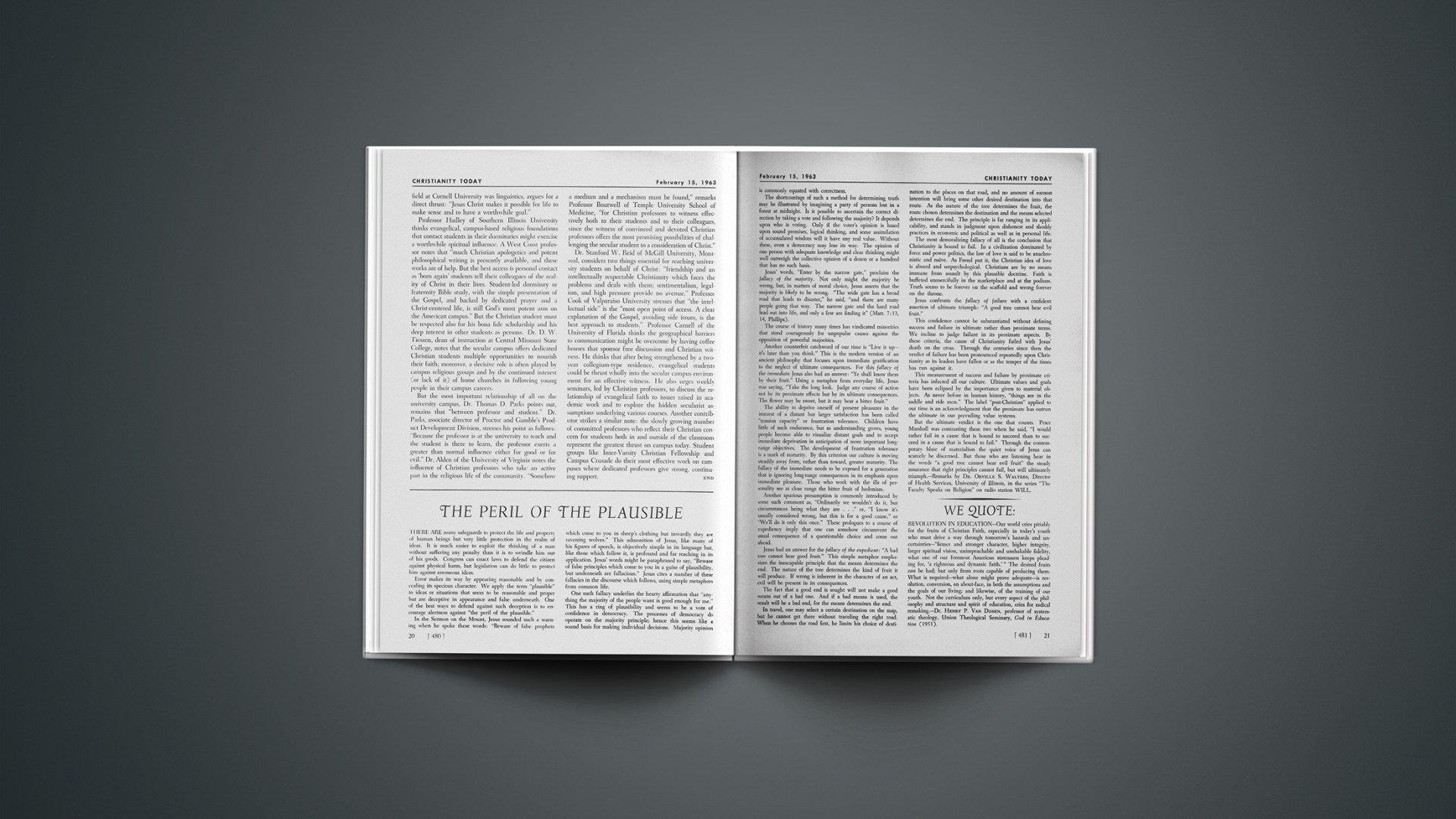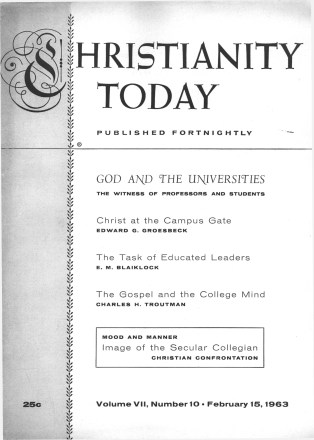There are many safeguards to protect the life and property of human beings but very little protection in the realm of ideas. It is much easier to exploit the thinking of a man without suffering any penalty than it is to swindle him out of his goods. Congress can enact laws to defend the citizen against physical harm, but legislation can do little to protect him against erroneous ideas.
Error makes its way by appearing reasonable and by concealing its specious character. We apply the term “plausible” to ideas or situations that seem to be reasonable and proper but are deceptive in appearance and false underneath. One of the best ways to defend against such deception is to encourage alertness against “the peril of the plausible.”
In the Sermon on the Mount, Jesus sounded such a warning when he spoke these words: “Beware of false prophets which come to you in sheep’s clothing but inwardly they are ravening wolves.” This admonition of Jesus, like many of his figures of speech, is objectively simple in its language but, like those which follow it, is profound and far reaching in its application. Jesus’ words might be paraphrased to say, “Beware of false principles which come to you in a guise of plausibility, but underneath are fallacious.” Jesus cites a number of these fallacies in the discourse which follows, using simple metaphors from common life.
One such fallacy underlies the hearty affirmation that “anything the majority of the people want is good enough for me.” This has a ring of plausibility and seems to be a vote of confidence in democracy. The processes of democracy do operate on the majority principle; hence this seems like a sound basis for making individual decisions. Majority opinion is commonly equated with correctness.
The shortcomings of such a method for determining truth may be illustrated by imagining a party of persons lost in a forest at midnight. Is it possible to ascertain the correct direction by taking a vote and following the majority? It depends upon who is voting. Only if the voter’s opinion is based upon sound premises, logical thinking, and some assimilation of accumulated wisdom will it have any real value. Without these, even a democracy may lose its way. The opinion of one person with adequate knowledge and clear thinking might well outweigh the collective opinion of a dozen or a hundred that has no such basis.
Jesus’ words, “Enter by the narrow gate,” proclaim the fallacy of the majority. Not only might the majority be wrong, but, in matters of moral choice, Jesus asserts that the majority is likely to be wrong. “The wide gate has a broad road that leads to disaster,” he said, “and there are many people going that way. The narrow gate and the hard road lead out into life, and only a few are finding it” (Matt. 7:13, 14, Phillips).
The course of history many times has vindicated minorities that stood courageously for unpopular causes against the opposition of powerful majorities.
Another counterfeit catchword of our time is “Live it up—it’s later than you think.” This is the modern version of an ancient philosophy that focuses upon immediate gratification to the neglect of ultimate consequences. For this fallacy of the immediate Jesus also had an answer: “Ye shall know them by their fruit.” Using a metaphor from everyday life, Jesus was saying, “Take the long look. Judge any course of action not by its proximate effects but by its ultimate consequences. The flower may be sweet, but it may bear a bitter fruit.”
The ability to deprive oneself of present pleasures in the interest of a distant but larger satisfaction has been called “tension capacity” or frustration tolerance. Children have little of such endurance, but as understanding grows, young people become able to visualize distant goals and to accept immediate deprivation in anticipation of more important long-range objectives. The development of frustration tolerance is a mark of maturity. By this criterion our culture is moving steadily away from, rather than toward, greater maturity. The fallacy of the immediate needs to be exposed for a generation that is ignoring long-range consequences in its emphasis upon immediate pleasure. Those who work with the ills of personality see at close range the bitter fruit of hedonism.
Another spurious presumption is commonly introduced by some such comment as, “Ordinarily we wouldn’t do it, but circumstances being what they are …” or, “I know it’s usually considered wrong, but this is for a good cause,” or “We’ll do it only this once.” These prologues to a course of expediency imply that one can somehow circumvent the usual consequence of a questionable choice and come out ahead.
Jesus had an answer for the fallacy of the expedient: “A bad tree cannot bear good fruit.” This simple metaphor emphasizes the inescapable principle that the means determines the end. The nature of the tree determines the kind of fruit it will produce. If wrong is inherent in the character of an act, evil will be present in its consequences.
The fact that a good end is sought will not make a good means out of a bad one. And if a bad means is used, the result will be a bad end, for the means determines the end.
In travel, one may select a certain destination on the map, but he cannot get there without traveling the right road. When he chooses the road first, he limits his choice of destination to the places on that road, and no amount of earnest intention will bring some other desired destination into that route. As the nature of the tree determines the fruit, the route chosen determines the destination and the means selected determines the end. The principle is far ranging in its applicability, and stands in judgment upon dishonest and shoddy practices in economic and political as well as in personal life.
The most demoralizing fallacy of all is the conclusion that Christianity is bound to fail. In a civilization dominated by force and power politics, the law of love is said to be anachronistic and naïve. As Freud put it, the Christian idea of love is absurd and unpsychological. Christians are by no means immune from assault by this plausible doctrine. Faith is buffeted unmercifully in the marketplace and at the podium. Truth seems to be forever on the scaffold and wrong forever on the throne.
Jesus confronts the fallacy of failure with a confident assertion of ultimate triumph: “A good tree cannot bear evil fruit.”
This confidence cannot be substantiated without defining success and failure in ultimate rather than proximate terms. We incline to judge failure in its proximate aspects. By these criteria, the cause of Christianity failed with Jesus’ death on the cross. Through the centuries since then the verdict of failure has been pronounced repeatedly upon Christianity as its leaders have fallen or as the temper of the times has run against it.
This measurement of success and failure by proximate criteria has infected all our culture. Ultimate values and goals have been eclipsed by the importance given to material objects. As never before in human history, “things are in the saddle and ride men.” The label “post-Christian” applied to our time is an acknowledgment that the proximate has outrun the ultimate in our prevailing value systems.
But the ultimate verdict is the one that counts. Peter Marshall was contrasting these two when he said, “I would rather fail in a cause that is bound to succeed than to succeed in a cause that is bound to fail.” Through the contemporary blare of materialism the quiet voice of Jesus can scarcely be discerned. But those who are listening hear in the words “a good tree cannot bear evil fruit” the steady assurance that right principles cannot fail, but will ultimately triumph.—Remarks by DR. ORVILLE S. WALTERS, Director of Health Services, University of Illinois, in the series “The Faculty Speaks on Religion” on radio station WILL.
WE QUOTE:
REVOLUTION IN EDUCATION—Our world cries pitiably for the fruits of Christian Faith, especially in today’s youth who must drive a way through tomorrow’s hazards and uncertainties—“firmer and stronger character, higher integrity, larger spiritual vision, unimpeachable and unshakable fidelity, what one of our foremost American statesmen keeps pleading for, ‘a righteous and dynamic faith.’ ” The desired fruits can be had; but only from roots capable of producing them. What is required—what alone might prove adequate—is revolution, conversion, an about-face, in both the assumptions and the goals of our living; and likewise, of the training of our youth. Not the curriculum only, but every aspect of the philosophy and structure and spirit of education, cries for radical remaking.—Dr. HENRY P. VAN DUSEN, professor of systematic theology, Union Theological Seminary, God in Education (1951).










